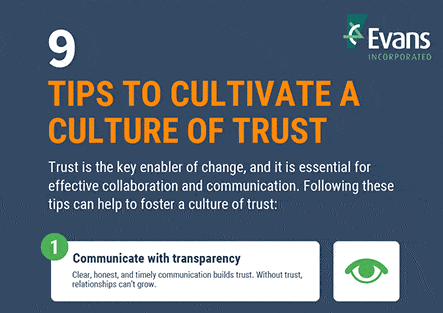Culture – The Foundation of a Successful Strategy
Even a well-planned strategy can fall apart during implementation if employees are unwilling to accept it. You may think you can simply require employees to comply, but their motivation and enthusiasm depends on the type of business culture they work in and whether it’s reflected in your strategy.
Each organizational culture is unique, with certain strategic advantages, and it makes complete sense for organizations to harness those advantages during the strategic planning process. Take, for example, a company that gives its employees schedule and location flexibility to build their routines around their personal lives, resulting in a culture built on support, fun, and work-life balance. On the other hand, consider a company that thrives in a state of bold employee competition for recognition and promotion, resulting in a culture marked by efficiency and productivity, and a reputation as a market leader. The cultures of these two firms are drastically different, so much that employees who succeed at one firm may find it very difficult to acclimate to the other. Over time, it’s important for each company to become self-aware, hiring new employees that are good cultural fits, reinforcing culture through performance management and social activities, and even pursuing business that reflects their cultures.
Inconsistencies Between Cultural Realities and Strategic Desires
Ensuring that your organizational culture is consistent with your strategic plan is so important that it can sometimes determine the success or failure of your organization. Culture is a collection of shared norms or values within a workplace. This is your organization’s DNA, sometimes described as “how we do things here”. If it’s positive and healthy, your culture is one of your most sustainable competitive advantages because it is very difficult to copy.
Fun, serious, family-friendly, cut-throat, positive, negative, upbeat, stressful – These adjectives are commonly used to describe workplace cultures. Some characteristics have positive influences in production and performance, while others are harmful and can contribute to strife or dissatisfaction. To illustrate, if your company culture focuses on creating an enjoyable office environment where employees feel like family, but your strategic plan overlooks that emphasis and instead describes the need to ramp up production and shoulder more work, employees may reject that strategy. Similarly, if your culture emphasizes individual achievement and your strategy calls for teamwork, your staff may show up late for meetings or miss them all together when they don’t align to their individual goals.
Cultural Roots – Formal Policies vs. Informal Conventions
While you may think that formal corporate policies establish the cultural foundation of your organization. However, it’s more likely that informal rules or conventional behaviors among employees hold more sway. For example, in cultures where technological innovation is seen less as a driver of positive change and more as an unwelcome threat to the status quo, policies that support investments in technology will eventually be thwarted by employees who are unwilling to change.
In the context of strategy implementation, an organization with a culture of individual competition may encounter a lack of social and emotional commitment to carry out the strategy if employees are asked to make personal sacrifices for the collective good. In this case, a culturally-optimized strategy would create a framework to reward individual achievements that contribute to corporate goals.
Evans’ Human-Centered Strategic Planning
At Evans Incorporated, our strategy consultants emphasize the people in the process to craft a tailored strategic plan with you, not for you. We incorporate a cultural assessment during the early stages of our approach and carry that cultural impression through to implementation. This way, the employees responsible for turning your plans into reality will buy in, recognizing that the strategy builds upon your unique cultural foundation and reflects what they value the most.
To find out more about how Evans’ human-centered approach to strategy can enrich you and your organization, please contact Jesse Lambert, Senior Principal & Strategic Planning Practice Lead, at jlambert@evansconsulting.com or (703) 969-9680.



